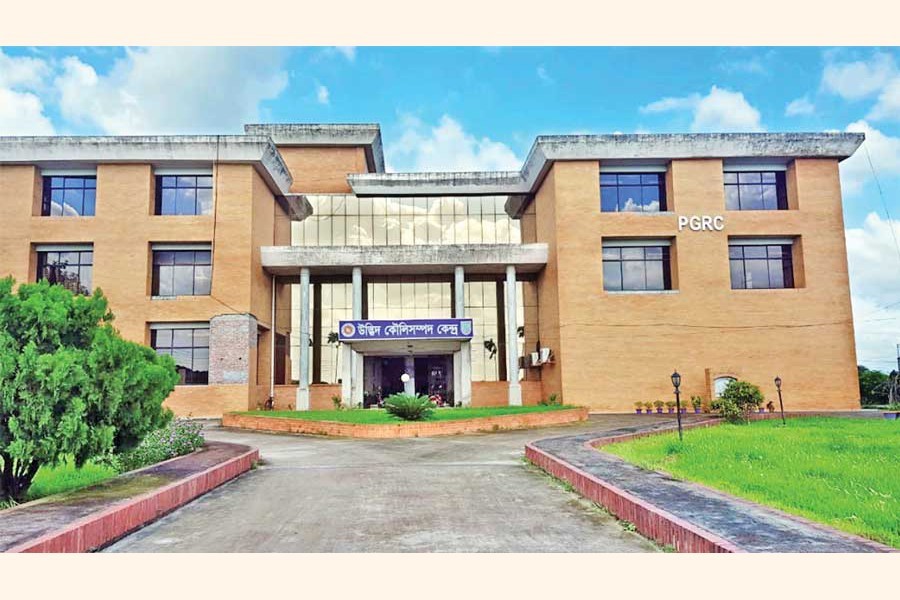Setting up plant seed institute: Move revived after two decades

Published :
Updated :

The government has recently taken a fresh move to establish an institute for conserving the country's plant seeds or germplasm, both traditional and endangered ones.
The Cabinet, the executive office of the prime minister, has inquired about the initiative to set up the 'Bangladesh Institute of Plant Genetics Resources (BIPGR)', reviving the move after 22 years.
"There are some observations from the Cabinet about the matter and we are now working on it," Kamalaranjan Das, research wing chief of the ministry of agriculture told the FE.
The Cabinet approval is a mandatory process before sending something to the parliament for making a law.
Plant genetic resources for agriculture are raw materials that scientists use to improve quality and productivity of crops through hybrid or tissue culture.
Such an institute conserves germplasm genetic traits of traditional, endangered and commercially viable species.
For lack of such a formal national institute, the country's plant genetics remained unprotected and so far, many varieties were lost or smuggled out from the country.
Rangpur lime, which grows plenty in California, USA, is believed by many to have been drained out from Bangladesh.
This is necessary for any exchange of germplasm with other counterparts.
This is particularly important for improving the variety through hybridization and tissue culture.
In 1997, an international seminar of FAO held in Dhaka suggested setting up a separate institute for conservation of traditional varieties, land race and improve them for the welfare of the people
A project was also undertaken by the government in fiscal year 1999-2000. But, after developing a part of physical infrastructure in Joydevpur, there is no more progress in the project as of now.
People at the Bangladesh Agricultural Research Institute, where the infrastructure is located, told the FE that many germplasms were getting damaged for lack of such an organisation.
They said that there is a need for a formal announcement now to formulate an appropriate law and hiring some skilled people.
They, however, said that they were working on the matter as the Cabinet inquired about whether it contradicts other laws.
"Actually, a law was passed by parliament in 2019 on the preservation of seeds, which is far more different than that of the institute law," said a person working on the issue at the BARI.
In the meantime, people who had initiated or promoted the matter were frustrated as so many years elapsed.
They argued that another Institute named Bangladesh Wheat and Maize Research Institute in Dinajpur had started much later but had been established two years back.
Dr. Lutfur Rahman, a former professor at the Bangladesh Agriculture University, said that foreign citizens now can take away local seeds as there is no protective measures.
"Even we cannot bring a single seed home from neighbouring India as they had formed such an institute in 1976," said Dr. Rahman, who has been fighting for it since the early stage. He said this institute will give a sovereign rights on the local seeds.
Mapping of seeds and their characterization and conserving them through genebank is the task of the institute.
He said improving quality of species is necessary for food security and such institute conducts such researches.
Dr. Rahman said that not only all the neighbouring countries have the same facility, but even Nepal, a small economy, also established the same.
Currently more than 100 countries have the same institute.
Prof. Dr. Shahidur Rashid Bhuiyan, acting president at the Krishibid Institution, said that they recently opined in a draft law on the matter.
"I don't know why it is taking time," said Dr. Bhuiyan who was the Pro Vice Chancellor at the Share-e-Bangla Agriculture University.
He said Bangladesh is a signatory of many international conventions and such institute is required to fully comply with those.
There is an international seed vault in Norway named global seed vault. Member nations preserve their respective seeds as an attempt to better preservation. Bangladesh is missing the opportunity due to lack of such Institute.
jasimharoon@yahoo.com


 For all latest news, follow The Financial Express Google News channel.
For all latest news, follow The Financial Express Google News channel.